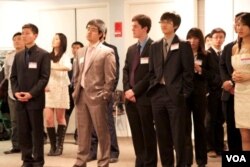For international students who are studying abroad in the United States, doubtless one challenge is culture clash. However, for Chinese students, me included, there is another crucial one – political clash.
Majoring in international relations, I have taken many courses that are related to Chinese politics. Tibet, Taiwan, human rights, freedom of speech and dictatorship are the top five issues that American students in my politics classes here in the United States tend to put on the table and criticize while talking about China. Sometimes, it can make things uncomfortable for Chinese students, who are extremely sensitive about those issues.
I still remember the first writing class in my freshman year, when a girl introduced herself by saying “I’m Taiwanese,” and another student from mainland China responded, “We are asking which country you come from, not which province.” Suddenly, the entire class was in a complete and embarrassing silence.
I grew up in mainland China, where Chinese history textbooks have been telling us since elementary school that Tibet belongs to China, that Taiwan belongs to China, and that China is developing in the right direction thanks to the brilliant leadership of China’s Communist Party. I was also taught that western countries, especially the United States, are hegemonic and greedy capitalists, given that fact that the Eight-Power Allied Forces invaded China in the 1890s. In China, those who haven't got a chance to go abroad and experience western democracy, especially the elder generation who have experienced the wars, view western countries as enemies of China, and believe the western media has been “demonizing China.”
At the same time, I remember vividly reading a New York Times story about the successful launch of Chinese satellites, and not understanding why they included a commentary on Beijing’s human right issues in the story. So in the U.S. today, among those who haven't been to China or heard from Chinese perspectives, the misunderstandings continue as well. In China and in the U.S. we're each surrounded by media, textbooks and other channels that teach us to look at each other from particular viewpoints, and these different educations and backgrounds can cause political clashes.
One good example I experienced was with my grandfather. He is a nice but somewhat stubborn gentleman who remembers the wars and the Chinese Cultural Revolution. When I interned for CBS News this summer in Beijing, I did some research on migrants in Chinese megacities and how they survive on such low salaries. My grandfather called me one day. “I heard from your mom that you are now working for the American media,” he said, and after a short pause, “Qian, always remember, don’t do anything harmful to our country.” I sighed, and did not know how to respond. “Grandpa,” finally I said, “I love my country, and I’m always trying to make her a better one.”
Another example was with a professor of mine. One day, we went to the professor’s house for a barbecue and for dessert he served us ice cream. When he passed the ice cream to me, he asked, “Do you have ice cream in China?”
I was surprised to find out he thought we might not have ice cream in China. But I glanced at the ice cream and asked back, smiling, “Is this ice cream made in China?” Everyone applauded. The professor laughed as well, and said that was a smart answer.
Over time, through different courses that I have taken, and different opinions I have heard, I have learned how to see politics from a neutral perspective; in other words, to understand the pros and cons of both the Chinese and American political systems. I believe there is no absolute rightness or wrongness about politics, only winners or losers. Different political systems are just ideologies and values rather than rightness or truths. What leads to the political clash is that, like culture clash, people who come from two different regions and two different political ideologies may misunderstand each other - not know each other well. And thus, they do not respect each other.
Half a month ago, when I passed the crossroad at Times Square of New York City, I saw a giant screen broadcasting down at thousands of people in the square. The screen was showing CNN, which was broadcasting news about a hit-and-run car accident in China. Ironically, just one block away, the Chinese state news agency had leased a giant sign, 60 feet high by 40 feet wide, to broadcast a Chinese promotional video and build China's international image.
I was standing at the crossroad, turning right to read the CNN screen, and turning left to watch the Chinese promotion video. I appreciate this position and think that is a proper position for me -- understanding both the good and bad aspects of my country, being proud but open-minded, thinking outside of the box, fighting back when others attack maliciously, and knowing that criticizing can encourage developing.




